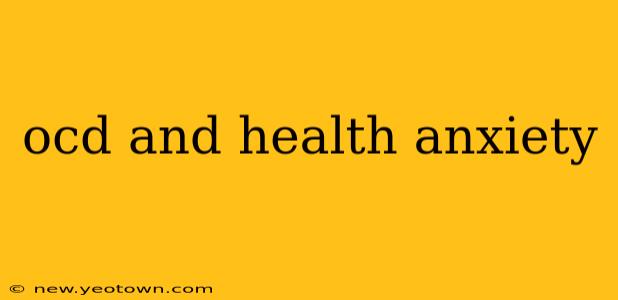The incessant hum of worry. The relentless checking. The gnawing fear that something is terribly, irrevocably wrong. This isn't just stress; this is the often-overlooked connection between Obsessive-Compulsive Disorder (OCD) and health anxiety. It's a complex dance, a tightly wound spiral where intrusive thoughts about illness fuel obsessive behaviors, creating a cycle that can be debilitating. Let's unravel this intricate relationship.
Imagine Sarah, a successful lawyer in her late thirties. Sarah's life was a carefully orchestrated symphony until the day a fleeting headache sent her spiraling. The headache itself was mild, but the thought – What if it's a brain tumor? – lodged itself firmly in her mind. This wasn't a fleeting worry; it became an obsession. She started checking her body relentlessly for any other symptoms, researching brain tumor symptoms online for hours, and repeatedly visiting her doctor. The reassurance she desperately sought proved temporary, replaced by a new wave of fear focused on a different, equally improbable illness. This, in essence, is the nature of health anxiety intertwined with OCD.
What is Health Anxiety?
Health anxiety, also known as hypochondria, is an excessive and persistent worry about having or developing a serious illness. This fear isn't based on real medical evidence; instead, it's fueled by misinterpretations of normal bodily sensations or minor symptoms. Individuals with health anxiety often experience significant distress and may engage in repetitive health-checking behaviors (like repeatedly checking their pulse or consulting medical websites).
How Does Health Anxiety Relate to OCD?
The connection between OCD and health anxiety is strong. Both involve intrusive, unwanted thoughts (obsessions) and repetitive behaviors or mental acts (compulsions) aimed at reducing anxiety. In health anxiety, the obsessions center on the fear of illness, and the compulsions might involve excessive reassurance-seeking, repeated doctor visits, or constant self-examination.
Is Health Anxiety a Form of OCD?
While health anxiety often co-occurs with OCD, it's not technically a form of OCD. Health anxiety can exist independently, although many individuals with health anxiety also meet the diagnostic criteria for OCD or another anxiety disorder. The overlap lies in the shared mechanisms of intrusive thoughts and repetitive behaviors designed to neutralize anxiety.
What are the Common Symptoms of OCD and Health Anxiety?
Symptoms of OCD:
- Obsessions: Recurrent, intrusive, and unwanted thoughts, images, or urges that cause significant distress.
- Compulsions: Repetitive behaviors or mental acts performed to reduce anxiety associated with obsessions. Examples include excessive handwashing, checking, ordering, or counting.
Symptoms of Health Anxiety:
- Excessive worry about health: Persistent fear of having or developing a serious illness, despite reassurances from medical professionals.
- Misinterpretation of bodily sensations: Normal bodily sensations are interpreted as signs of serious illness.
- Repetitive health-checking behaviors: Repeatedly checking for symptoms, consulting medical websites, or seeking reassurance from doctors.
How are OCD and Health Anxiety Treated?
Both OCD and health anxiety are effectively treated with a combination of therapies and, sometimes, medication. Cognitive Behavioral Therapy (CBT), particularly exposure and response prevention (ERP), is a cornerstone treatment for both conditions. CBT helps individuals identify and challenge their negative thoughts and behaviors, gradually reducing their anxiety and improving their ability to cope with intrusive thoughts. Medication, such as selective serotonin reuptake inhibitors (SSRIs), can also be helpful in managing symptoms.
Can Health Anxiety Lead to OCD?
While it's not a direct causal relationship, health anxiety's repetitive checking and reassurance-seeking can, over time, develop into compulsive behaviors that fit the criteria for OCD. The constant cycle of worry and checking reinforces the anxiety, making it harder to break free. Early intervention is crucial.
How Can I Tell if I Have OCD or Health Anxiety?
Only a qualified mental health professional can diagnose OCD or health anxiety. If you're experiencing persistent worry about your health or engaging in repetitive behaviors to reduce anxiety, it's essential to seek professional help for a proper diagnosis and treatment plan.
This journey through the intertwined worlds of OCD and health anxiety underscores the importance of seeking professional guidance. Remember, you are not alone, and help is available. The path to recovery involves understanding, compassion, and the courage to seek professional support.

